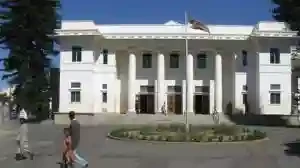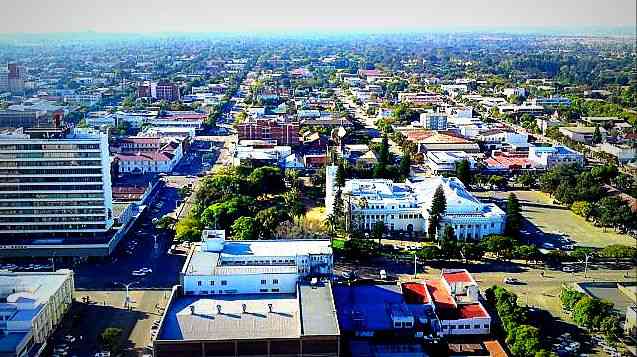It the inaugural In Conversation with Trevor Ideas Festival held in Nyanga late last month Alpha Media Holdings chairman Trevor Ncube led a panel discussion featuring founders of start-ups in Zimbabwe .
Ncube (TN), who is the host of In Conversation with Trevor spoke to Gugulethu Siso (GS), Brian Munyawarara (BM), Ryan Katayi (RK) and Victor Mapunga (VM) to explore the start-up ecosystem in Zimbabwe.
Below are excerpts from the discussion.
TN: What we are going to do is say who you are, what you are doing, and how these people can help.
So as briefly as possible, who you are, what you are doing and how this people can help you.
Keep Reading
- In Conversation With Trevor: Munyati: Sports, arts are viable careers
- In Conversation with Trevor: Bango: ‘Street wisdom’ shaped me
- In Conversation With Trevor : Diplomatic posting was a mistake: Chihombori-Quao
- I’ve been a victim of racism in classical music: Mhambi
GS: Thank you. Good morning everyone.
My name is Gugulethu Siso, please feel free to call me Gugu.
I am the CEO as well as the co-founder of Thumeza.
So we are fin-tech that uses a loan management platform in order to help small scale transporters get logistics liquidity.
So in essence getting them access to invoice financing.
We are looking for partnerships within fast moving goods companies in South Africa and beverage companies.
So if you have got any connections that would be greatly appreciated, thanks.
TN: Wonderful. That was sweet and sharp. And who are you, and what are you doing and how can we help you?
BM: Good morning Trevor. My name is Brian Munyawarara.
I am the CEO of Raysun Capital.
We are a financial services company that specialises in short- term credit for small companies as well as short-term credit for individuals.
Currently, I think the support that we would require is enabling us to expand currently in Zimbabwe, and also across the borders yeah.
TN: Fantastic. Who are you by the way? Haha.
RK: I'm not sure if this is audible is it?
TN: Yes.
RK: All right. My name is Ryan Katayi.
I'm a CEO and co-founder of FarmHut.
We are operational in Zambia and in Zimbabwe.
We do machine learning-based credit scoring for farmers in Zambia.
We are working with MTN and a number of banks.
Then in Zimbabwe we are also working with development agencies to fund initiatives by farmers, many of them yeah.
So that is what we do here and in Zambia.
TN: And how can we help you?
RK: We need money. If you want to fund our works, we look to expand.
We are looking to expand to South Africa and Kenya, that is for year 2024 targets, to get into Kenyan markets and also to get into the huge South African market.
TN: Fantastic. Right [now to] the one who was giving the CIMAS CEO some problems.
VM: Hi everyone. I am Victor Mapunga.
I am the founder and CEO of FlexID Technologies.
Basically, at FlexID what we do is we have developed a digital identity platform built on the blockchain, and essentially, we are the people that are trying to eliminate all those forms you have to fill [in] when you go to the bank or when you go to the hospital.
When you are asked to give us your proof of residence we want it to all happen within one click, because basically when you have a digital ID that has information about who you are, where you work, your payslip, your transactions and everything, it makes it far much easier for you to interact with the broader aspect of the economy.
So we are B- to-B business.
So essentially what it means is that we are looking at large enterprises, we are looking at healthcare companies like Cimas, we are looking at insurance companies, we are looking at banks and financial institutions like Raysun such that all these institutions, once they have integrated into our ecosystem I do not have to continuously fill in paperwork when I go from Cimas and I go to CBZ, and I go elsewhere, everything can just happen within one ecosystem.
So, in terms of what we are looking for: Number 1 it is those partnerships with such institutions, including academic institutions as universities and secondly we are creating a sales process.
So, if you are familiar with Microsoft, IBM, [or] Oracle you have all these sales integrators.
We want to empower local Zimbabweans to also now market our products.
Not just in Zimbabwe, but if you are in Botswana, if you are in Namibia, if in South Africa, they all need this solution.
So you can partner with us and you can actually push that product and we will ensure that you actually get a very good commission and create a viable business from that innovation thank you.
TN: Fantastic. I am going to go around again asking the same question Gugu.
What is it that you are struggling with in terms of the ecosystem?
What is standing in your way? And secondly, what opportunities do you see for your enterprise?
What are you struggling with within the ecosystem? How can the ecosystem be improved?
GS: So we have moved. We started back in 2018.
I was a logistics aggregator. Dr Ishmael there is one of the few people that really got what we do because he is in the logistics sector.
I do not know if you guys remember, but I think it was back in 2021 [when] SI 127 came out; in essence saying that whoever owes your money in US dollars can pay you back in local currency.
Unfortunately, as you know we borrow financing to small scale transporters. The bulk of our financing came from outside of the continent...
TN: Sure.
GS: Now imagine having to borrow [from] someone money in US dollars and they are paying you back in what in essence could be half and in local currency?
My business model was dead on the ground so we left. It is not something that the ecosystem could help me with.
There is no amount of mentorship, which unfortunately is what we keep getting offered to start-ups that could help with that problem.
So, people keep saying that start-ups are leaving Zimbabwe, we [are] not being patriotic but right now what we are looking at is the economics of the stomach and the wallet.
If I have to survive and build this business in a way that makes sense I have to leave and then look for opportunities that makes sense later on in order to come back.
So I say the support that the ecosystem needs [is] we need more early stage investors.
People that understand that the start-up ecosystem is a long game right.
It is not to that you are going to give me US$5 000 today and expect to me to jump up and I am now you know employing 50 people. It is not realistic.
It is really not. So, I think we need more entrepreneurs to put back those little cheques into those ecosystems as well as then actual internship that makes sense and hey this is a partnership not hey this is what I did you know 20 years ago.
What happened 20 years ago might not be realistic to what I am doing now right.
So just give me the money, connect me to someone who you think can help me right now and then let me run it. I think that is what we live right now.
TN: But the issue that you are raising Gugu, the one of SI whatever the number is, that is huge.
I mean it decimates you right there? Speak to that in terms of what it means in terms of affecting your ecosystem?
GS: I do not think a lot of people quiet [understand], I know Brian next to me will understand what it means because you are in the business of borrowing money, but I think in terms of day to day economics not a lot of people actually understand how it impacts their business until you have to go to court and get someone to pay you back.
That is when you start getting your lawyer saying oh hey by the way you know that your creditor has these certain rights, and you are like what do you mean they have the right to pay me back in local currency?
And the judge says yeah but they have got this option.
So unfortunately, the ecosystem that we are in right now, I am not trying to hate guys, [but] until you get to a certain point where you are now suing someone to get you to get your money back I do not think there is quite an understanding of how these SI’s actually affect our businesses on a day-to-day basis.
So what I would say is guys fail fast as much as you can if someone does not you fulfil their obligations against you.
Go after them so that you learn those lessons very early whilst you do not have eyes on you.
Because as you can imagine if you are now you know a US$10 million business things become complicated, but if there is no one watching you right now I think you can make as many mistakes as you can.
TN: Wow. Wow. Speak to, you in the financial sector, those SI’s that we cannot name them, I do not know how many they are, that come in and disrupt your operations?
You are in the financial sector. And secondly, how can as I asked here, how can the ecosystem for start-ups be an enabler to the things that you do?
BM: You have got civil society, you have got people that are in academia.
All these people are contributing to this ecosystem, so now how the SI’s affect the ecosystem is that if we have got a player in the ecosystem the government, there is no real work that we can carry forward here in Zimbabwe without the government's involvement.
We need them to make policies that help start-ups, that help the finance sector work well.
Our businesses had to close at a certain point in 2019. Why? Because they introduced [an SI].
We were lending in USD at a certain point and then they said that from today onwards it is all RGS, and from that the interest rate kept going [up], the inflation rate kept going up, but then people were still paying back at an interest rate that we had given them earlier on.
We could not cope with that so we had to close shop for a bit, regroup and then come back again.
So those kinds of things are the things that are affecting the start-up ecosystem because they make the policies but the policies affect these start-ups that are still at infancy.





